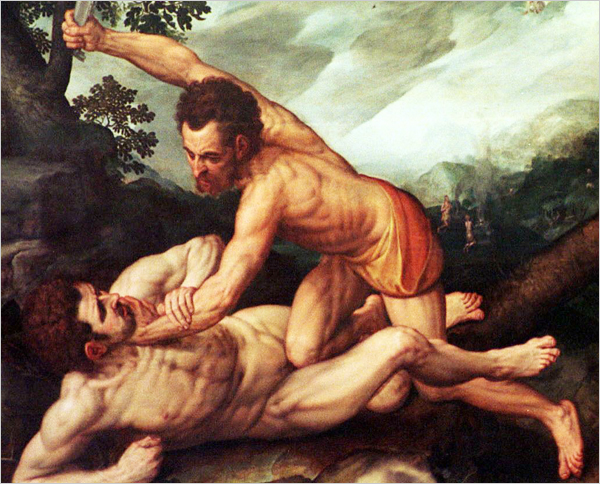Genesis 4
What it literally says: Adam and Eve bear their first children, two sons who they name Cain and Abel. Cain works "the soil," and Abel "[keeps] flocks" (2). One day they both give an offering to the LORD and He "looked with favor on Abel ... but on Cain ... he did not look with favor" (5). Filled with anger, Cain lures his brother out to the field and kills him. God confronts Cain, then banishes him from the land, "marking" him so that anyone who kills him will suffer a worse curse.
Cain begins a family, the next several generations being listed. Adam and Eve have a third son, Seth, who has a child in the future called Enosh.
And "at that time men began to call on the name of the LORD" (26).
What it says to me: We have some pretty strong disobedient acts early on in our human history, don't we? I guess it makes sense that as new creations newly evicted into a new world, one of the first major personal revelations would be to stop completely something we don't like. I think of a naive child when I think of Cain, not knowing that the full breadth of the consequences of his actions can have a wider effect than just on himself. But at the same time, I think he was well aware of what he was doing, even going so far as to disguise his intent of bringing Abel into the field. He was jealous. He was angry. He felt entitled, maybe, just like his mother might have felt a little entitled when she saw that the fruit wouldn't kill her but open her eyes (albeit, she didn't realize that this was a bad thing). Who knows ... we don't even know how old Cain and Abel are (despite the above picture's depiction); at least they're old enough to work the field and shepherd a flock. Was this murder at the hands of an angsty teenager or a plotting young adult or older? Doesn't really matter, I think. The act itself is the focus.
God also asks another question as if He didn't know the answer:
Where is your brother, Abel (9)?
Cain definitely fits the teenager theory with his classic back-talk:
I don't know. Am I my brother's keeper (9)?
I can just imagine a Cosby response. But of course, God's sense of humor would be gravely inappropriate in this life-and-death matter. Not only does He exile Cain, but He basically makes him live out the rest of his life as a marked man, like an offender who everyone needs to know is in the neighborhood (and who will actually give a worse punishment to anyone who kills him, "seven times over," 15). However, God shows His unfathomable grace then just as He does today. Cain deserves death, but instead he's let go, not off the hook, but to be gone, scarred literally and mentally.
On a lighter note, God apparently made other human beings besides the not-so-fab four! Cain travels to the land of Nod located east of Eden. Out of left field comes verse 17: "Cain lay with his wife ..." We totally jump the whole mentioning of other people, what dates Cain and Mystery Woman might have gone on, and are told flat out that Cain got 'imself married! She must like that whole bad boy image thing. Or Cain's ambition; he's now building a city named after their firstborn, Enoch.
With this firstborn comes the first begat ... begat family tree portions of scripture. And dang you don't hear names like those anymore: Mehujael, Lamech, Zillah, Tubal-Cain, et al. I'm sure many of us have joked around at naming our current or future kids something crazy like Irad or Methushael, but coming up with a name inspired by one of these would be pretty stinking cool and unique (but, Abby, I know we won't be doing that, I'm just making conversation).
After everything, though, occurs a very interesting coincidence. Cain and his wife's first child is named Enoch. Adam and Eve have another son, Seth, who has a son himself named Enosh.
Enoch ... Enosh.
Looks like the fruit doesn't fall too far from the tree of Knowledge of Good and Evil.
Finally what caught my eye this morning was the unembellished last verse that says "At that time men began to call on the name of the LORD." Was this the beginning of "religion?" I honestly have no idea what this means but men were beginning to call on God ... for help? For guidance? For provision? To praise? Whatever it means, that one verse rings with poignancy as the infancy of our collective need for God.
Well, only 1,185 more chapters to go!

Remind me what Enoch is again?
ReplyDelete